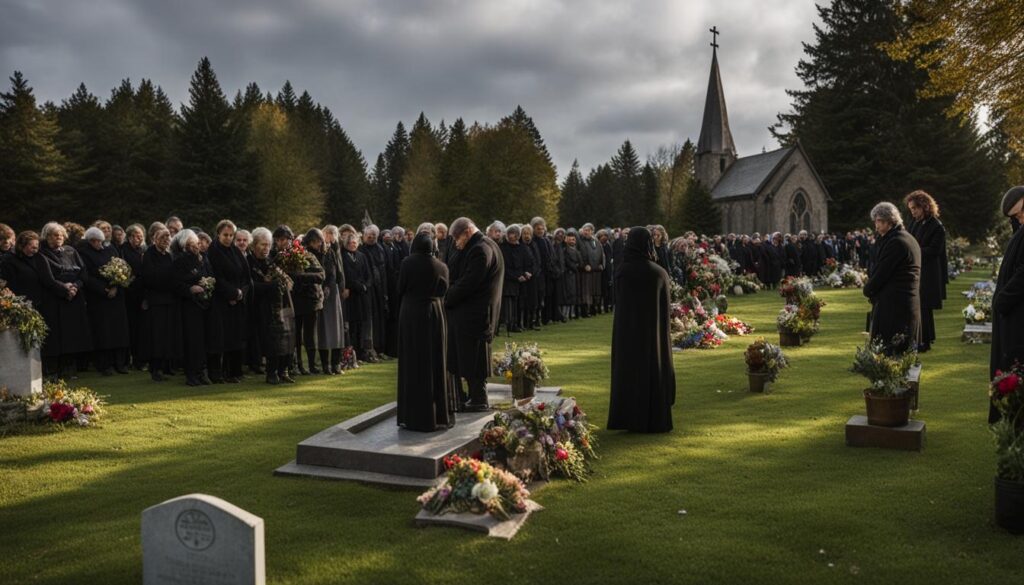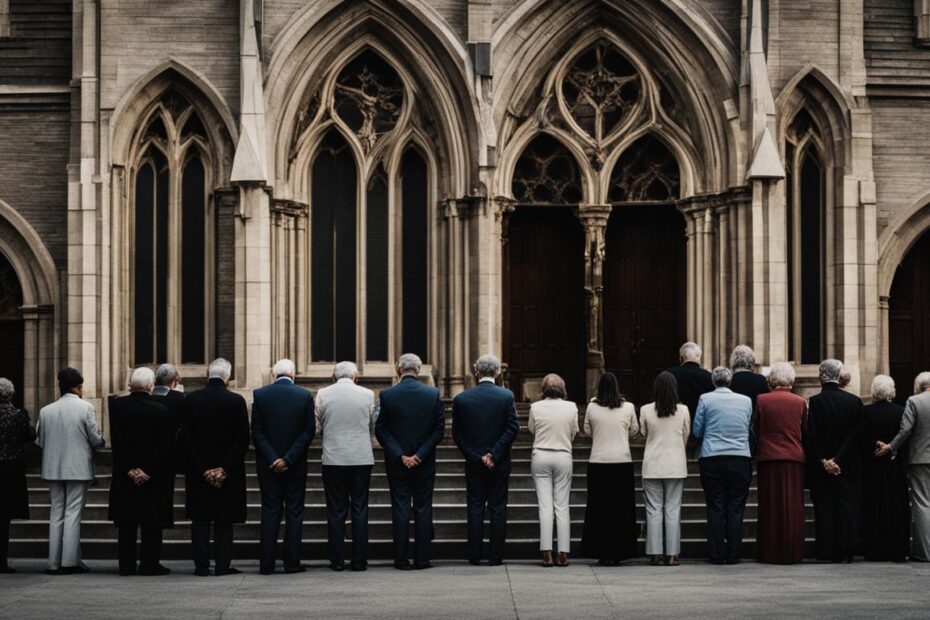When attending a funeral, it can be difficult to find the right words to say to the bereaved family. What can you say to provide comfort and support during this challenging time? Choosing your words carefully and offering sincere condolences and prayers can make a meaningful impact on those who are grieving.
Key Takeaways:
- Express your condolences and sympathy to the bereaved family
- Acknowledge the loss and offer support
- Choose your words carefully and avoid platitudes
- Share personal memories or positive qualities of the deceased
- Be sincere and genuine in your expression of sympathy
What to Say to Someone Before a Funeral
Before a funeral, it is essential to reach out to the bereaved person and offer your support. This can be done through various means like sending a heartfelt card, making a comforting phone call, or visiting them briefly to express your condolences in person. These gestures provide the bereaved person with permission to express their emotions and offer a sense of comfort during this challenging time.
When communicating with someone before a funeral, it is vital to acknowledge their loss and let them know that you are there for them. You can express your sympathy and genuine concern, offering words of comfort and a listening ear. Depending on their religious beliefs, you may also choose to offer specific funeral prayers or words that align with their faith. For instance, Islamic funeral prayers, Christian funeral prayers, Hindu funeral prayers, Buddhist funeral prayers, or Jewish funeral prayers can be appropriate and meaningful, providing solace to the bereaved person.
“I am deeply sorry for your loss. Please know that my thoughts and prayers are with you during this difficult time. If there is anything I can do to support you and your family, please don’t hesitate to reach out. May [deceased’s name]’s soul rest in peace.”
Remember, it is important to be sincere and genuine in your words, showing empathy and understanding. By offering your support and acknowledging the impact of their loss, you provide comfort and reassurance to those who are grieving.

| Religion | Funeral Prayers |
|---|---|
| Islamic | Allahu Akbar, Allahumma ghfir lihayyina wa mayyitina, wa shahidina wa ghayibina, wa saghirina wa kabirina… |
| Christian | Eternal rest grant unto them, O Lord, and let perpetual light shine upon them. May their souls, and the souls of all the faithful departed, through the mercy of God, rest in peace. |
| Hindu | O Lord, lead me from death to life, from falsehood to truth. Lead me from despair to hope, from fear to trust. Lead me from hate to love, from war to peace. Let peace fill our hearts, our world, our universe. |
| Buddhist | May [deceased’s name] find peace and liberation from all suffering. May their soul journey toward enlightenment and reach the ultimate state of Nirvana. |
| Jewish | Barukh atah Adonai, Eloheinu, melekh ha’olam, dayan ha-emet. |
What to Say at a Funeral Service
Attending a funeral service can be an emotional and challenging experience. It is important to offer your sympathy and support to the grieving family during this difficult time. Choosing the right words can provide comfort and solace, honoring the memory of the deceased and providing support to those left behind. Here are some suggestions on what to say at a funeral service:
Express condolences
Begin by expressing your condolences to the grieving family. Let them know that you are sorry for their loss and that you are there to offer support. A simple, heartfelt message such as “I am truly sorry for your loss. Please know that I am here for you” can go a long way in providing comfort.
Share personal memories
If you have a personal memory or story about the deceased, sharing it can be a meaningful way to honor their life. Reflect on a positive interaction or a special moment you shared with them. By sharing your memories, you not only pay tribute to the person who has passed away but also provide comfort to the family by showing them that their loved one had a positive impact on others.
Offer support and prayers
Let the grieving family know that they are in your thoughts and prayers. You can say something like “May you find comfort and strength during this difficult time. You are in my prayers.” This simple gesture can provide reassurance and support to the family, reminding them that they are not alone in their grief.
Attending a funeral service is an opportunity to offer sympathy, share memories, and provide support to the grieving family. By choosing your words with care and sincerity, you can contribute to a meaningful and comforting experience for everyone involved.

What to Say to Someone After a Funeral
After a funeral, when the initial shock and ceremony of saying goodbye have passed, your support and words of comfort are more important than ever. The grieving person may still be processing their emotions and navigating through the healing process. Your kind words can provide solace and reassurance during this difficult time.
One of the most important things you can say is simply, “I’m here for you.” This simple statement lets the grieving person know that they are not alone and that you are available to offer support. Be prepared to listen and provide a safe space for them to express their feelings, without judgment or interruption.
It’s also acceptable to acknowledge that you may not have the right words to say. Sometimes, the act of listening and being present is more powerful than any words. You can say, “I don’t know what to say, but I genuinely wish I could ease your pain. Know that I care about you and am here to support you in any way I can.”
Remember that grief is a unique and personal journey for each individual. Be patient and understanding, allowing the grieving person to grieve in their own way and at their own pace. Use your words to offer comfort, empathy, and reassurance, knowing that your support can make a profound impact during this challenging time.
Table 1: Examples of Words to Say After a Funeral
| Example | Description |
|---|---|
| “I’m here for you.” | Expressing your availability and support. |
| “I don’t know what to say, but I genuinely wish I could ease your pain.” | Acknowledging the difficulty of finding the right words while still offering care and compassion. |
| “Take all the time you need to grieve. I’ll be here for you.” | Granting permission and understanding for the grieving person to navigate their own healing process. |
| “I can’t imagine how hard this is for you, but please know that I’m here to support you in any way I can.” | Recognizing the depth of the grieving person’s pain while affirming your commitment to their well-being. |
Remember, your words have the power to provide comfort and support to someone who is grieving. Choose them with sincerity and empathy, offering reassurance and a listening ear. Your presence and kind words can make a significant difference as the bereaved person navigates the challenging path of grief.
Things you should not say at a funeral
When attending a funeral, it is important to choose your words carefully and be mindful of the impact they can have on the bereaved family. There are certain things that should be avoided, as they can unintentionally cause more pain or discomfort. Here are some examples of what not to say at a funeral:
- “They’re in a better place now.” While this sentiment may be well-intentioned, it can come across as dismissive of the grief the family is experiencing. It is important to acknowledge their loss and validate their emotions.
- “They had a good life.” While it may be true that the deceased lived a long and fulfilling life, this statement can minimize the impact of their loss on the family. Instead, focus on expressing condolences and offering support.
- “I know how you feel.” Each person’s grief is unique, and assuming that you understand exactly how the bereaved person feels can invalidate their experience. Instead, listen and empathize without comparing their grief to your own.
Remember, the goal is to provide comfort and support to the grieving family. Be sincere, genuine, and sensitive in your words, and offer your condolences and assistance in any way you can.
| What not to say | Why it should be avoided |
|---|---|
| “They’re in a better place now.” | May trivialize the grief and dismiss the bereaved family’s emotions. |
| “They had a good life.” | Minimizes the impact of the loss on the family. |
| “I know how you feel.” | Invalidates the unique nature of each person’s grief. |
Notable Quote:
“The right words at a funeral can provide comfort and solace, while the wrong words can unintentionally cause more pain. Choose your words wisely and be sensitive to the grieving family’s emotions.” – Unknown
Summary:
At a funeral, it is essential to be mindful of the impact your words can have on the bereaved family. Avoid trivializing the grief by using platitudes like “they’re in a better place now” or “they had a good life.” Also, refrain from assuming you know how the bereaved person feels and avoid comparing their grief to your own experiences. It is crucial to be sensitive, sincere, and genuine in your expression of condolences and support.
How to Help Someone Who Is Grieving
Supporting someone who is grieving can be challenging, but your presence and understanding can make a significant difference in their healing process. Here are some ways you can provide help and support to someone who is grieving:
- Be present: Show up for the person who is grieving, both physically and emotionally. Listen attentively and offer a shoulder to lean on. Your presence alone can provide immense comfort.
- Offer practical assistance: Grief can make even the simplest tasks feel overwhelming. Offer specific help, such as shopping for groceries, preparing meals, or helping with household chores. These practical gestures can alleviate some of the burdens during a difficult time.
- Provide emotional support: Grief often brings a rollercoaster of emotions. Be patient and understanding as the person navigates through their feelings. Offer a listening ear, validate their emotions, and encourage them to express themselves openly.
- Respect their individual grieving process: Each person grieves differently, so it’s important to respect their unique process. Avoid judgment or comparisons to your own experiences. Instead, empathize and validate their emotions without trying to fix or minimize their pain.
Remember, the journey of grief takes time, and your continued support can make a profound impact on their healing. Be there for them, offering a compassionate and understanding presence as they navigate through their grief.

Table: Ways to Help Someone Who Is Grieving
| Ways to Help | Description |
|---|---|
| Be present | Show up physically and emotionally, offering support and a listening ear. |
| Offer practical assistance | Help with daily tasks like grocery shopping, meal preparation, or household chores. |
| Provide emotional support | Be patient, understanding, and empathetic as they navigate their emotions. |
| Respect their individual grieving process | Avoid judgment or comparisons, and validate their unique experience of grief. |
Writing and delivering a eulogy
A eulogy is a powerful way to honor and remember the life of a loved one who has passed away. It is a heartfelt speech that allows us to share memories, stories, and reflections about the person we have lost. When writing a eulogy, it is important to create a meaningful tribute that captures the essence of the individual and celebrates their life.
The eulogy should begin with an introduction, providing an overview of the person’s life and their impact on others. This could include their achievements, passions, and positive qualities. It is also a good idea to include personal anecdotes or stories that highlight their unique personality and experiences.
As you write the eulogy, consider the audience and the purpose of the speech. Think about what the person meant to their family and friends, and how you can convey that in your words. Remember to be genuine and sincere in your delivery, and allow yourself to express your emotions as you speak.
When delivering the eulogy, it is important to speak clearly and confidently. Practice beforehand, but also be open to the emotions that may arise. Take your time, pause if needed, and make eye contact with the audience to connect with them. You may also choose to incorporate meaningful quotes, poems, or other elements that add depth and resonance to the eulogy.
Writing and delivering a eulogy is a deeply personal and meaningful way to pay tribute to a loved one. It allows us to honor their life, share cherished memories, and find comfort in the act of remembrance. By choosing our words carefully and speaking from the heart, we can create a eulogy that truly celebrates and honors the person who has passed away.
“A eulogy is a chance to say farewell, to honor a life, and to find solace in shared memories.” – Unknown

Eulogy Tips and Techniques
Writing and delivering a eulogy can be a daunting task, but it is also a meaningful way to honor and remember the life of a loved one. Here are some tips and techniques to help you craft a heartfelt and memorable eulogy:
- Prepare and practice: Take the time to gather your thoughts, memories, and stories about the person who has passed away. Organize your speech and practice delivering it to ensure that you can express yourself clearly and confidently.
- Be authentic: Share personal anecdotes and memories that highlight the unique qualities and impact of the deceased. Be genuine in your expression of emotion and allow yourself to be vulnerable, as this will create a deeper connection with the audience.
- Focus on the positive: While it is natural to feel sadness during a eulogy, try to emphasize the positive aspects of the person’s life. Highlight their accomplishments, passions, and the joy they brought to others. Celebrate their legacy and the lasting impact they have had on the lives of those around them.
- Keep it concise: A eulogy should be heartfelt and meaningful, but it is important to keep it within a reasonable time frame. Aim for a length of 5-10 minutes, as this allows for a meaningful tribute without overwhelming the audience.
“A eulogy is a final gift of love to the person we have lost. It is an opportunity to honor their life, share cherished memories, and provide comfort to those who are grieving.” – Unknown
Remember, writing and delivering a eulogy is a deeply personal experience. There is no right or wrong way to do it, as long as it comes from the heart. Take the time to reflect on the life of the person you are eulogizing, and trust your instincts to create a heartfelt tribute that honors their memory and brings comfort to those who are mourning.
| Eulogy Tips and Techniques | |
|---|---|
| Prepare and practice | Take the time to gather your thoughts, memories, and stories about the person who has passed away. Organize your speech and practice delivering it to ensure that you can express yourself clearly and confidently. |
| Be authentic | Share personal anecdotes and memories that highlight the unique qualities and impact of the deceased. Be genuine in your expression of emotion and allow yourself to be vulnerable, as this will create a deeper connection with the audience. |
| Focus on the positive | While it is natural to feel sadness during a eulogy, try to emphasize the positive aspects of the person’s life. Highlight their accomplishments, passions, and the joy they brought to others. Celebrate their legacy and the lasting impact they have had on the lives of those around them. |
| Keep it concise | A eulogy should be heartfelt and meaningful, but it is important to keep it within a reasonable time frame. Aim for a length of 5-10 minutes, as this allows for a meaningful tribute without overwhelming the audience. |
Finding Closure Through Eulogies
When we lose someone we love, the grief and pain can feel overwhelming. It’s during these difficult times that eulogies can provide a path to healing and closure. By writing and delivering a eulogy, we have the opportunity to honor the life of the deceased and celebrate their memory.
Eulogies allow us to share stories, memories, and reflections that highlight the impact the person had on our lives. Through heartfelt words, we can remember their achievements, passions, and the love they brought to those around them. It’s a chance to come together as a community, support each other, and find solace in our shared memories.
As we deliver a eulogy, we connect with the audience on an emotional level, sharing our grief and celebrating the life that was lived. The power of our words can bring comfort, laughter, and tears, allowing us to express our love and honor the person who has passed away. It’s a way to find closure while keeping their memory alive in our hearts.
“A eulogy is not just about speaking, it’s about listening; it’s about understanding the depth of the emotions that surround us and offering solace through our shared experiences.” – Unknown
Through the act of writing and delivering a eulogy, we can find closure in the midst of grief. The words we speak hold the power to bring comfort, healing, and a sense of peace. By honoring the life that was lived, we can navigate the journey of grief and find strength in knowing that our loved one’s memory will always be cherished.
| Key Points: |
|---|
| Writing and delivering a eulogy can provide closure and healing during times of grief. |
| Eulogies allow us to honor the life of the deceased and celebrate their memory. |
| Through heartfelt words, we can remember their achievements and the impact they had on our lives. |
| The power of our words can bring comfort, laughter, and tears, allowing us to express our love and honor the person who has passed away. |
| The act of writing and delivering a eulogy helps us find closure while keeping the memory of our loved one alive. |
The Power of Words in Honoring a Life
Words have a remarkable ability to honor a life and provide comfort to those who are grieving. When attending a funeral or memorial service, carefully chosen funeral prayers and prayer words can offer solace and support to the bereaved. These words hold the power to acknowledge the loss, express condolences, and honor the memory of the deceased. Whether recited individually or as part of a collective service, funeral prayers have the ability to create a sense of unity and communal grieving.
Furthermore, delivering a heartfelt eulogy can be a powerful way to honor the life of the departed. Through storytelling, memories, and reflections, a eulogy can paint a vivid picture of the person’s character, achievements, and impact on others. By choosing the right eulogy words, one can celebrate the unique qualities and contributions of the deceased, providing a source of comfort and closure to the grieving family and friends.
Additionally, funeral prayers and eulogies can serve as a means of preserving the memory of the departed. These spoken tributes become cherished memories for those left behind, allowing them to revisit and honor the life of their loved one in the days, months, and years that follow. The power of words, whether expressed in the form of a prayer, eulogy, or conversation, can provide a lasting legacy and serve as a source of healing and comfort for those who are mourning.
Honoring a Life: Table of Funeral Prayers
| Religion | Funeral Prayers |
|---|---|
| Islamic | Janazah prayer, Salat al-Janazah |
| Christian | The Lord’s Prayer, Funeral Liturgy |
| Hindu | Antyesti, Pinda Daan |
| Buddhist | Paritta chanting, Final Abode Prayer |
| Jewish | Kaddish, El Malei Rachamim |
The table above highlights funeral prayers from different religious traditions, providing a foundation for choosing appropriate prayers to honor the deceased and offer comfort to the bereaved. These prayers have been passed down through generations, reflecting the beliefs, values, and cultural practices of each religion.
“The power of words is undeniable. Through carefully chosen funeral prayers and heartfelt eulogies, we have the ability to honor a life, heal the grieving, and preserve the memory of those we have lost.”
In conclusion, funeral prayers, eulogies, and prayer words have the power to transform grief into a celebration of life. They offer comfort, support, and closure to those who are mourning the loss of a loved one. With the right words, we can truly honor a life and provide solace to those who need it most.
Conclusion
In conclusion, the words spoken at the end of a funeral hold great significance in providing solace and support to the bereaved family and friends. During this challenging time, offering heartfelt condolences, sharing personal memories, and providing unwavering support can bring comfort and healing to those who are grieving.
Writing and delivering a eulogy can be an immensely powerful way to honor the life of the departed and find closure through the act of remembrance. By carefully choosing your words and expressing genuine sympathy, you can create a meaningful tribute that celebrates the positive qualities and impact of the person who has passed away.
Funeral prayers play a vital role in finding solace and closure after a funeral. These prayers offer comfort, strength, and a sense of connection to a higher power. They provide a space for reflection, healing, and finding solace amidst the grief. The power of prayer can bring immense comfort and peace to the hearts of those who are mourning.
As we navigate the journey of grief, it is important to remember that closure is a personal and unique process for everyone. Finding closure after a funeral involves allowing ourselves to acknowledge and experience our emotions, seeking support from loved ones, and finding ways to honor and remember the life of the departed. Through the power of words and the support of the community, healing and closure can be found even amidst the pain of loss.
FAQ
What do you say at the end of a funeral?
Saying something personal and kind about the deceased can be appreciated by the family. Examples of what to say include expressing condolences, acknowledging the loss, and offering support. Avoid platitudes and statements that trivialize the grief. Instead, be sincere and genuine in your words.
What to say to someone before a funeral?
It is important to acknowledge the loss and show your support to the bereaved person. You can send a card, make a phone call, or visit them briefly. These gestures give the bereaved person permission to express their feelings and provide them with a sense of comfort. You can offer your condolences and let them know that you are there for them during this difficult time. Depending on their religious beliefs, you may also choose to offer specific funeral prayers or words of comfort that are appropriate to their faith.
What to say at a funeral service?
It is important to offer your sympathy and support to the grieving family. You can express your condolences and let them know that they are in your thoughts and prayers. It is usually appreciated if you can say something personal about the deceased, such as sharing a memory or acknowledging their positive qualities. This helps to honor the person who has passed away and provides comfort to the family. Choose your words carefully and be sincere in your expression of sympathy.
What to say to someone after a funeral?
After a funeral, the kind words of comfort from those who attended can be remembered by the family for a long time. It is important to acknowledge the bereaved person’s grief and offer your support. You can express your sympathy and let them know that you are there for them. It is also acceptable to say that you don’t know the right words or how to help, but you genuinely wish you could. By being honest and empathetic, you show that you care and are available to support them through their grief.
What are things you should not say at a funeral?
Platitudes and minimizing statements, such as “they’re in a better place now” or “they had a good life,” should be avoided as they can trivialize the grief and minimize the impact of the loss. It is also important not to assume that you know how the bereaved person feels or compare their grief to your own experience. Each person’s grief is unique, and it is important to listen and support rather than make assumptions or shift the focus onto your own experiences.
How to help someone who is grieving?
When someone is grieving, it is important to offer both practical and emotional support. Instead of simply saying “let me know if you need anything,” be specific in your offer and provide practical help such as cooking, childcare, or shopping. Help them with paperwork or other tasks that may feel overwhelming after a death. Emotional support is also crucial, so be there to listen and support them through their grief. Actions often speak louder than words, so both practical help and emotional support can go a long way in helping someone who is grieving.
How to write and deliver a eulogy?
A eulogy is a speech given at a funeral or memorial service to honor and remember the life of the deceased. When writing a eulogy, it is important to start with an introduction, provide a timeline of the person’s life, and focus on what made them special. You can include details about their achievements, passions, and impact on others. The closing of a eulogy can be a personal choice, such as using an inspirational quote, sharing a poem, or expressing final thoughts and goodbyes.
What are eulogy tips and techniques?
When delivering a eulogy, it is important to keep certain tips and techniques in mind. Practice your speech beforehand, but remember that it is okay to show emotion and pause if needed. Use notes or prompts to help you stay on track and organized. Make eye contact with the audience to connect with them and gauge their response. Consider incorporating elements of humor or lightheartedness if appropriate, as it can help uplift the mood during a difficult time. End your eulogy with a heartfelt and meaningful closing that reflects the life and impact of the person being honored.
How can eulogies help with finding closure?
Eulogies can provide a sense of closure and healing for those who are grieving. They allow for the sharing of memories, stories, and reflections that honor the life of the deceased. Through the process of writing and delivering a eulogy, family and friends can find solace and comfort in the act of remembering and celebrating the person who has passed away. It is a way to keep their memory alive and to find closure in the midst of grief.
What is the power of words in honoring a life?
Words have the power to honor a life and provide comfort to those who are grieving. Whether it is through funeral prayers, sharing memories, or delivering a eulogy, the right words can have a profound impact. It is important to choose your words carefully, to be sincere and genuine in your expression of sympathy, and to focus on the positive qualities and impact of the person who has passed away. By using the power of words, we can create a meaningful and heartfelt tribute to honor the life of a loved one.








